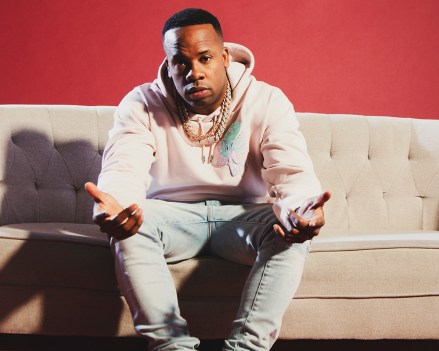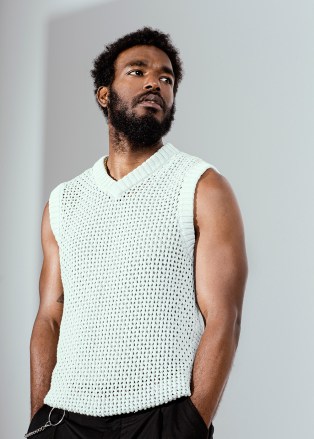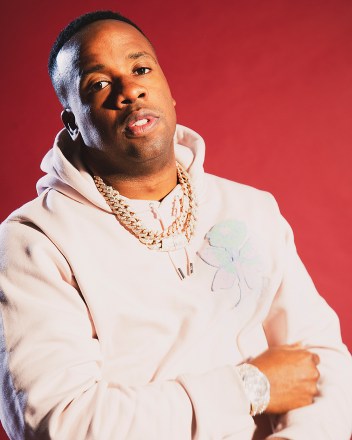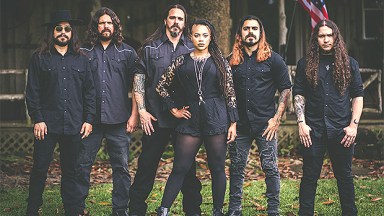
Though metal comes in many forms and genres – thrash, stoner, technical death, industrial, just to name a few – it often comes in only one color. Bands like Oceans Of Slumber are changing that perception. Fronted by Cammie Gilbert, a Black woman hailing from Houston, Texas, Oceans Of Slumber have released a new self-titled album via Century Media Records today (Sept. 4). It’s the first album since the band underwent a lineup change, and comes at a time when music – and the world, in general — is in upheaval. The protests following the deaths of George Floyd, Breonna Taylor, and other Black people have forced many to confront the racism within their music scenes. Cammie has spoken about her own experiences with racism, both in and out of the Metal community, and she tells HollywoodLife how she’s put her unique point-of-view in this new music.
“When we approached writing this album, Dobber [Beverly, Oceans Of Slumber’s drummer/founding member and Cammie’s partner] was like, ‘let’s talk about you. Let’s get out of our head, and let’s get into how you feel on a grander scale of a Black woman here in the south and translating that into our music,'” says Cammie when speaking EXCLUSIVELY with HollywoodLife. “That’s not a perspective that’s very prevalent in the metal community. So, when we went about writing these songs, it was a green light to really dive into the anger and the displacement, confusion, and conflict that feel about areas of my life – whether they’re self-imposed or societal-imposed. We really dove into exploring things that have obviously always been there and always been troubling, but, for so long, were kind of swept under the rug. We want to shed light on these issues that are forming these craters underneath everyone.”
In addition to addressing these issues on Oceans Of Slumber, Cammie says that this album represents a new direction for the band, thanks to the addition of Semir Ozerkan on bass, and both Alexander Lucian and Jessie Santos on guitars. The trio joined a year after the band’s last album, The Banished Heart, and Cammie says they brought “brought so much energy and a new focus into what we were doing, what we were going to put out.”
“We wanted to showcase our influences,” added Cammie, “and really dig into the atmosphere and dynamics that we love so much from previous albums. And then with the new perspectives and the new take on interpreting these different [musical elements], many different ideas that we had going into the songs. We put them together in the new self-titled album. We feel so confident that it’s a big step forward.”
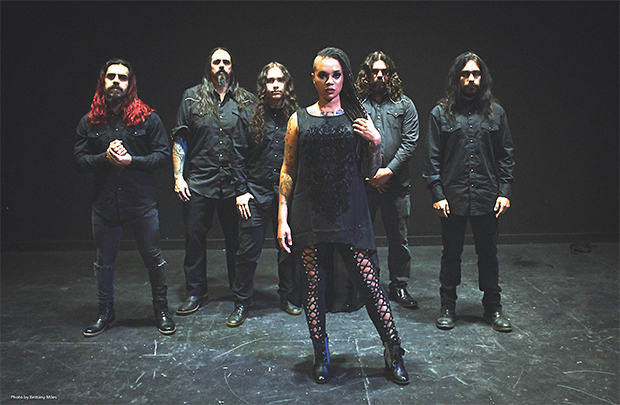
“Everything that we do is meant to [create] an atmosphere. We wanted to create a world within our album.” An Oceans Of Slumber album, says Cammie, should give you an experience that “takes over the room. There’s an emotional picture that comes to mind with everything that we create.” When asked if there’s a particular moment on Oceans Of Slumber that gives her that emotional moment, Cammie points to the song, “To The Sea (A Tolling of the Bells)”
“There’s a moment where the chorus comes back in, and I feel like the whole song, the whole room, the whole recording booth just, like, burst open. There was space, stars, and infinity, and all the world and longing go into the grief that transcends time. It feels like it’s such a big moment on the album in that song. It’s a chest-opener, a heart-opener.”
“I think every album, there’s one song that can do that for me, and I think, in turn, will do that for listeners. There are so much love and so much warmth and emotion at that moment. When you’re in it, and you’re listening closely, it’s inescapable. It could shatter everything.”
Being both a woman and Black – two traits not immediately associated with the genre – Cammie said she felt slightly insecure about herself when she joined Oceans Of Slumber in 2015. “When I first kind of got into the band and first coming into metal, there was a lot of self-consciousness about being a black woman in metal and not necessarily coming from a metal background,” says Cammie. Though music was prevalent throughout her upbringing, she grew up in a Baptist home, where there were more R&B and hip-hop, and less Iron Maiden and djent. However, Cammie found that her background was more harmonious with metal than one would think.
“Metal didn’t teach me to sing, but the tones and vibes and essences that go into gospel, and blues, and jazz – which is like, the very reason there’s prog [rock] – they’re there and they’re the same. I love metal. I love the aesthetics and the atmosphere that metal is, but the emotion and the attention to detail – I think the things, they marry each other just fine.”
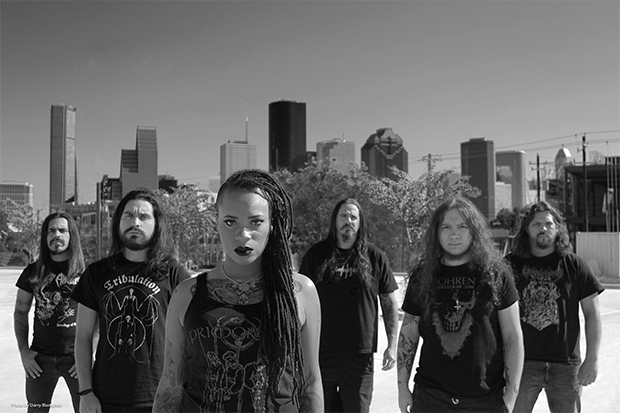
Oceans of Slumber is Dobber Beverly, Cammie Gilbert, Mat A. Aleman, Semir Ozerkan, Jessie Santos, and Alexander Lucian.
“There have been [metal] been songs throughout my life,” she says. “If I think back to when I first started listening to rock and alternative, there was the album by Alice In Chains, Dirt. I think the emotions that came through on those songs – not like [the late Layne Stanley] was a huge belter, but there’s so much emotion in those songs. Grief and pain and understanding of these heavy emotions that most people my age at the time weren’t really acquainted with as I was. I felt something in me tethered to that style and that kind of musicianship.” Layne passed away in 2002, and it should be noted that Alice In Chains reformed in 2006 with singer William DuVall, a Black man hailing from Washington D.C.
As I got more into metal, bands like Evergrey – the album, The Storm Within, that was newer, but first, Monday Morning Apocalypse, and kind of getting into their discography,” continues Cammie when discussing her metal education. “There are these big, grant moments when you close your eyes when you know they wrote that, and it came from somewhere very real. I always look for those out of body experiences, that moment where it just erases that physical form, and I feel like this thing that can tune into that frequency, too. For a moment, you’re fully one with the song and one with the person who wrote it. And you’re like, ‘yeah, we’re similar along the way of the human condition.”
“Music intertwines people in a way that nothing else can,” she says before adding, with a laugh, “except maybe food.”
While metal does have to reckon with its racism – the genre of Black metal, almost ironically, has a bad Nazi problem – Cammie says that when she recently shared her anger, sorrow, and frustration over America’s racism, her viewpoint was welcomed.
“I pleasantly surprised how much support has come from within the metal community,” she tells HollywoodLife. “I think that I have a unique perspective — like, I’ve cultivated more women than the average metalhead, to be in my circle, and women of color, just all over the world. So that direct support comes from the immediate friend circle is there, but then, as the ripples go out, there were people that I didn’t expect to share – the white men of metal [laughs] – that were out there, and they were like, ‘we want to be past this. We want this to be fixed, and this should be obvious, and we send our sympathies at what you’re experiencing in America, but we’ve got our own problems to fix, and we want to be on the right side of the change needs to happen.'”
“I’ve always been outspoken. I’m a pretty introverted person, but I have very strong thoughts. And I overanalyze thoughts that go into things. I’ve lived with these truths, and I’ve lived with these things my entire life.”
When this being a time for all music communities to listen to Black/people of color (especially women) on how to make the scene more inclusive and inviting, Cammie endorsed a reform proposed by AJ Channer, lead vocalist from Fire from the Gods. “He was saying for the metal community to make tour bills more diverse. Because, then you’re bringing people from different genres and putting them together, and that love and [unifying] effect of music will play on all of them. I think that the best and most music-oriented way to also inadvertently cure any other ills – like, racism in the metal community.”
“Obviously, there should be diversity. Give every musician a chance on the merit of their musicianship, not of their culture. Or, not of their appearance. Then, if you have this diverse bill – not only because of their music but the kind of people in the band – then it’s going to bring all sorts of people together and allow music to unify them. Which, it’s does. It’s amazing.”
Unfortunately, it’s unlikely that these shows will be put together anytime soon. Though there have been attempts to throw COVID-19-safe concerts, for the most part, music venues remain shuttered in the wake of the coronavirus pandemic. On Sept. 1, convert venues across the country bathed their facilities in red light as part of the #RedAlertRESTART campaign, per Billboard. The demonstration was to urge Congress to pass the Restart Act, which would provide much-needed assistance to companies that have lost revenue during the pandemic. The act is tailored to assist companies like music venues, offering loan forgiveness to companies that have suffered high revenue loss while not penalizing industries that rely on part-time employees.
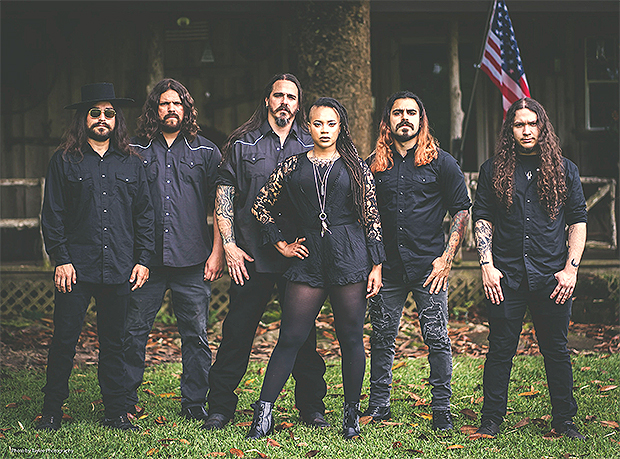
When America’s venues are safe to re-open, and Oceans Of Slumber get the green light to tour again, Cammie says she looks forward to fully experiencing all the sights, smells, and tastes that come with being in a band. “I miss when you arrive at the venue, and you unload, there’s that moment when you burst out of the venue,” says Cammie. “It’s not open yet, everyone’s loaded in, and everybody’s soundchecked, and up to that point, you haven’t been back outside. And so you burst back out to this venue door, and you stand outside while your eyes adjust to the sunlight, and you see the busy street of whatever city you’re in, whatever country you’re in, and you get to take it all in. And you go on this little time of exploration before doors open. We find a local treat shop or we go to get coffee or food. That is what I miss the most. You burst out of the venue, and you’re like, ‘here we are! We’ve arrived!’ and we finally get to see the city a little bit. It’s always just that moment.”
“I miss that moment the most,” she continues. “Obviously, being on stage – I feel a huge deficit too. I feel like I’m waiting for something, and I don’t know if it’s ever going to come back. Like, if your cat runs away. ‘I know you’re out there, and you can survive. But are you coming back?’ I need the stage, and I need people, more than I thought I did as an introvert. … In this time span of seeing nearly no one, I’ve definitely missed seeing people and the crowd and the business than I thought I would. There’s literally nothing like being on stage and having your songs received by people so eager to hear them, and you’re so eager to give them. There’s such a connection. Having had it, the idea of not having it again, it breaks something inside.”
Oceans Of Slumber, the band’s new self-titled album, is out now.
